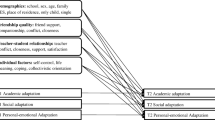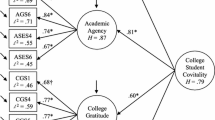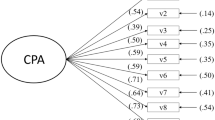Abstract
Second-, fourth- and sixth-year students (N = 536) in the humanities, sciences and medicine at a metropolitan university in Holland completed a questionnaire. It included standard measures of mental health variables, satisfactions, interpersonal orientations, and assessments of the learning environments. Evidence is presented about the reliability and validity of Crombag's College Adaptation Questionnaire (CAQ) to assess adjustment to student life. Internal consistency of adaptation scores was adequate and the association with social desirability responding was negligible. There were no significant differences between the sexes, major fields of study and cohorts. Strong support for convergent validity was obtained. The more adapted the students were, the less they experienced depressive moods, loneliness, and interpersonal helplessness; and the more they were satisfied with their lives in general, with their interpersonal relations in particular, and the more easily they made new contacts. For women students, the less well adapted they were, the more they reported psychosomatic stress symptoms. Adaptation was only weakly associated with social-risk-taking and very weakly, for men only, with problem drinking. Supporting discriminant validity, adaptation was in general only weakly related to the judgments of various facets of the learning environments (‘instructional climates’) in which the students partook.
Similar content being viewed by others
References
Crombag, H. F. M. (1968). Studiemotivatie en studieattitude. Groningen: Wolters.
Cronbach, L. J. (1951). Coefficient alpha and the internal structure of tests. Psychometrika, 16, 297–334.
Crowne, D. P. & Marlowe, D. (1964). The approval motive. Studies in evaluative dependence. New York: Wiley.
Dijkstra, L. (1980). Een hulpeloosheidsschaal (Research memorandum). Eindhoven: Technische Hogeschool, Department of Philosophy and Social Sciences.
Dirken, J. M. (1967). Arbeid en stress. Groningen: Wolters.
Flanagan, J. C. (1978). A research approach to improving our quality of life. American Psychologist, 33, 138–147.
Gaff, J. G., Crombag, H. F. M. & Chang, T. M. (1976). Environments for learning in a Dutch university. Higher Education, 5, 285–299.
Geensen, M. (1970). Waarneming van de studieomgeving: Deel 1 (Report No. 5). Leiden: Rijksuniversiteit, Educational Research Center.
de Jong-Gierveld, J. (1978). The construct of loneliness: Components and measurement. Essence, 2, 221–237.
Klip, E. C. (1970) Studiebegeleiding aan eerstejaarsstudenten. Groningen: Wolters-Noordhoff.
Lubin, B. (1965). Adjective checklists for measurement of depression. Archives of General Psychiatry, 12, 57–62.
Meuwese, W. & van Rooijen, L. (1966). Effecten van begeleiding van eerstejaarsstudenten door ouderejaarstutoren (Report No. 11). Eindhoven: Technische Hogeschool, Groep Onderwijsresearch.
Miller, W. R. (1976). Alcoholism scales and objective assessment methods: A review. Psychological Bulletin, 83, 649–674.
van Rooijen, L. (1965). Begeleiding van de Studie van eerstejaarsstudenten door ouderejaarstutoren (Doctoraalscriptie). Nijmegen: Katholieke Universiteit, Psychologisch Laboratorium.
van Rooijen, L. (1974). New evidence on the effectiveness of the Short Michigan Alcoholism Screening Test (SMAST) (Research memorandum). Ann Arbor: The University of Michigan, Department of Psychology.
van Rooijen, L. (1979). Widow's bereavement: Stress and depression after 11/2 years. In: I. G. Sarason & C. D. Spielberger (Eds.), Stress and anxiety (Vol. 6). Washington: Hemisphere.
van Rooijen, L. (1980). Depressiegevoelens van sociale oorsprong. Deventer: Van Loghum Slaterus.
van Rooijen, L. (1986). Depressiegevoelens bij de gewone bevolking. Gezondheid & Samenleving, 7, 115–124.
van Rooijen, L. & Arrindell, W. A. (1985). Depressiegevoelens bij psychiatrische patiënten en hun partners (Onderzoeksmemorandum RM-PS 85–20). Amsterdam: Vrije Universiteit, Vakgroep Sociale Psychologie.
van Rooijen, L. & Vlaander, G. P. J. (1984). Dramatic induction of depressive mood. Journal of Clinical Psychology, 40, 1318–1322.
Selzer, M. L., Vinokur, A. & van Rooijen, L. (1975). A self-administered Short Michigan Alcoholism Screening Test (SMAST). Journal of Studies on Alcohol, 36, 117–126.
Sermat, V. (1980). Toward a theory of social risk-taking (Research memorandum). Amsterdam: Vrije Universiteit, Vakgroep Sociale Psychologie.
Vlaander, G. P. J. & van Rooijen, L. (1981). Nieuwe gegevens over de Aanpassingsvragenlijst. Tijdschrift voor Onderwijsresearch, 6, 33–37.
Author information
Authors and Affiliations
Additional information
With special thanks to BOVO, the Educational Research Center, University of Leyden: “Quod licet BOVis, non licet Iovis”.
Rights and permissions
About this article
Cite this article
Van Rooijen, L. Advanced students' adaptation to college. High Educ 15, 197–209 (1986). https://doi.org/10.1007/BF00129211
Issue Date:
DOI: https://doi.org/10.1007/BF00129211




